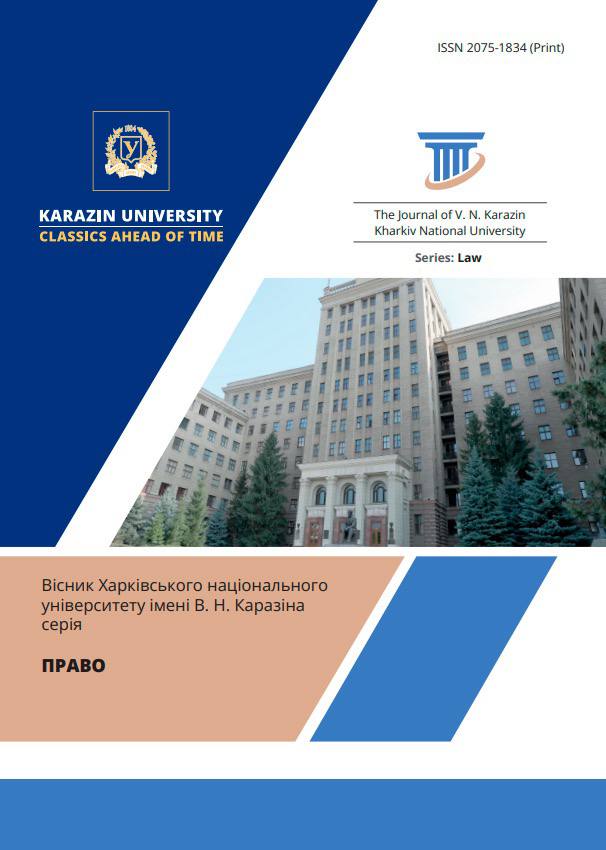ARTIFICIAL INTELLIGENCE IN COURT FUNCTIONING: ANALYSIS OF THE POSSIBILITIES AND LIMITATIONS OF ITS USE IN CRIMINAL JUSTICE
Abstract
In this article, the author examines the current issue of using robot judges in criminal justice and their potential to replace human judges. The article analyzes the role of judges in the judicial system, identifies the advantages of using robot judges, and also discusses the limitations and problems associated with their implementation in the judicial system.
The article discusses in detail the ethical and legal aspects of using artificial intelligence as a judge, including issues of fairness, transparency and accountability. The author reviews case studies and experiments conducted in this area, and analyzes international examples of the use of artificial intelligence algorithms in criminal justice.
The article also provides specific examples of the successful use of artificial intelligence in the judicial system of other states. Attention is also paid to the development and future of robot judges, taking into account technological progress and challenges related to ensuring fair and effective justice in the context of the introduction of artificial intelligence.
Downloads
References
Okoh, Chukwunoyenim, Robotic Judges: A Future to Desire or Not? (March 13, 2023). Available at SSRN: https://ssrn.com/abstract=4387301 or http://dx.doi.org/10.2139/ssrn.4387301, URL: https://papers.ssrn.com/sol3/papers.cfm?abstract_id=4387301
Benjamin Minhao Chen, Alexander Stremitzer, Kevin Tobia, HAVING YOUR DAY IN ROBOT COURT, Harvard Journal of Law & Technology, Volume 36, Number 1 Fall 2022, URL: https://jolt.law.harvard.edu/assets/articlePDFs/v36/Chen-Stremitzer-Tobia-Having-Your-Day-in-Robot-Court.pdf
Aleš Završnik, Criminal justice, artificial intelligence systems,and human rights, Електронне джерело, URL: https://link.springer.com/content/pdf/10.1007/s12027-020-00602-0.pdf
Плахотнік О.В., ПРАКТИЧНЕ ЗАСТОСУВАННЯ ШТУЧНОГО ІНТЕЛЕКТУ У КРИМІНАЛЬНОМУ ПРОВАДЖЕННІ, ВІСНИК КРИМІНАЛЬНОГО СУДОЧИНСТВА • № 4/2019, С. 48, URL: https://vkslaw.knu.ua/images/verstka/4_2019_PLAKHOTNIK.pdf
Сніґоля Матуєлене, Віктор Шевчук , b, Юрґіта Балтрунене Штучний інтелект в діяльності органів правопорядку та юстиції: вітчизняний та європейський досвід, Видано Національним науковим центром «Інститут судових експертиз ім. Засл. проф. М. С. Бокаріуса» та Національним юридичним університетом імені Ярослава Мудрого, 2022, С. 21.
Nyu Wang, Michael Yuan Tian, “Intelligent Justice”: human-centered considerations in China’s legal AI transformation, National Library of Medicine, Published online 2022 Aug 23, URL: https://www.ncbi.nlm.nih.gov/pmc/articles/PMC9396564/
SHINPACHI YOSHIDA, Japan’s police to increasingly partner up with AI to fight crime, September 2, 2021, URL: https://www.asahi.com/ajw/articles/14421414#:~:text=Whether%20the%20criminal%20activity%20you,the%20increasingly%20efficient%20multitasking%20technology.
Демура Марина Ігорівна, Використання технологій штучного інтелекту у протидії злочинності : матеріали наук.-практ. онлайн-семінару (м. Харків, 5 листоп. 2020 р.). – Харків : Право, 2020. – 112 с., URL: https://ivpz.kh.ua/wp-content/uploads/2020/12/Матеріали-семінару_Використання-техн-штучного-інтел_5.11.2020.pdf
Радутний О.Е. Штучний інтелект, інформаційна безпека та законотворчий процес (кримінально-правовий аспект). Інформація і право. 2018. С. 149–158.
Selivanov M. Електронний суд: IT-технології в судовому процесі як спосіб покращення прогнозованості судових рішень., Право України, 2018, 114-122. doi: https://doi.org/10.33498/louu-2018-01-114
Copyright (c) 2024 Владислав Блізнюк

This work is licensed under a Creative Commons Attribution 4.0 International License.




